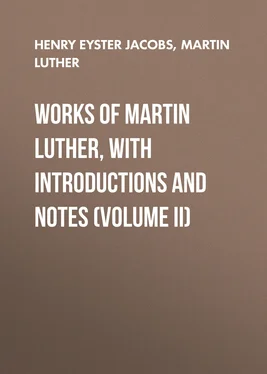Henry Eyster Jacobs - Works of Martin Luther, with Introductions and Notes (Volume II)
Здесь есть возможность читать онлайн «Henry Eyster Jacobs - Works of Martin Luther, with Introductions and Notes (Volume II)» — ознакомительный отрывок электронной книги совершенно бесплатно, а после прочтения отрывка купить полную версию. В некоторых случаях можно слушать аудио, скачать через торрент в формате fb2 и присутствует краткое содержание. Жанр: foreign_prose, foreign_religion, Философия, foreign_psychology, foreign_antique, на немецком языке. Описание произведения, (предисловие) а так же отзывы посетителей доступны на портале библиотеки ЛибКат.
- Название:Works of Martin Luther, with Introductions and Notes (Volume II)
- Автор:
- Жанр:
- Год:неизвестен
- ISBN:нет данных
- Рейтинг книги:3 / 5. Голосов: 1
-
Избранное:Добавить в избранное
- Отзывы:
-
Ваша оценка:
- 60
- 1
- 2
- 3
- 4
- 5
Works of Martin Luther, with Introductions and Notes (Volume II): краткое содержание, описание и аннотация
Предлагаем к чтению аннотацию, описание, краткое содержание или предисловие (зависит от того, что написал сам автор книги «Works of Martin Luther, with Introductions and Notes (Volume II)»). Если вы не нашли необходимую информацию о книге — напишите в комментариях, мы постараемся отыскать её.
Works of Martin Luther, with Introductions and Notes (Volume II) — читать онлайн ознакомительный отрывок
Ниже представлен текст книги, разбитый по страницам. Система сохранения места последней прочитанной страницы, позволяет с удобством читать онлайн бесплатно книгу «Works of Martin Luther, with Introductions and Notes (Volume II)», без необходимости каждый раз заново искать на чём Вы остановились. Поставьте закладку, и сможете в любой момент перейти на страницу, на которой закончили чтение.
Интервал:
Закладка:
[Sidenote: Abolition of Mortuary Masses]
16. It were also necessary to abolish all anniversary, mortuary and "soul" masses 274 274 The three kinds of masses are really but one thing, viz., masses for the dead, celebrated on certain fixed days in each year, in consideration of the enjoyment of certain incomes, received either out of bequeathed endowments or from the heirs of the supposed beneficiaries.
, or at least to diminish their number, since we plainly see that they have become nothing but a mockery, by which God is deeply angered, and that their only purpose is money-getting, gorging and drunkenness. What kind of pleasure should God have in such a miserable gabbling of wretched vigils and masses, which is neither reading nor praying, and even when prayed 275 275 i. e., Even when the mass is decently said.
, they are performed not for God's sake and out of willing love, but for money's sake and because they are a bounden duty. Now it is not possible that any work not done out of willing love can please God or obtain anything from Him. And so it is altogether Christian to abolish, or at least diminish, everything which we see growing into an abuse, and which angers rather than reconciles God. It would please me more—nay, it would be more acceptable to God and far better—that a foundation, church or monastery should put all its anniversary masses and vigils together, and on one day, with hearty sincerity, devotion and faith, hold a true vigil and mass for all its benefactors, rather than hold them by the thousand every year, for each benefactor a special mass, without this devotion and faith. O dear Christians! God cares not for much praying, but for true praying! Nay, He condemns the many and long prayers, and says in Matthew vi, they will only earn more punishment thereby [Matt. 67:7; 23:14]. But avarice, which cannot trust God, brings such things to pass, earing that otherwise it must die of hunger!
[Sidenote: Abolition of the Interdict]
17. Certain of the penalties or punishments of the canon law should also be abolished, especially the interdict 276 276 See above, p. 72, note 1.
, which is, beyond all doubt, an invention of the evil Spirit. Is it not a devil's work to try to atone for one sin with many greater sins? And yet, to put God's Word and worship to silence, or to do away with them, is a greater sin than strangling twenty popes at once, and far greater than killing a priest or keeping back some Church property. This is another of the tender virtues taught in the "spiritual law." For one of the reasons why this law is called "spiritual" is because it comes from the Spirit; not, however, from the Holy Spirit, but from the evil spirit.
The ban 277 277 See above, p. 104.
is to be used in no case except where the Scriptures prescribe its use, i. e., against those who do not hold the true faith, or who live in open sin; it is not to be used for the sake of temporal possessions. But now it is the other way around. Everyone believes and lives as he pleases, most of all those who use the ban to plunder and defame other people, and all the bans are now laid only on account of temporal possessions, or which we have no one to thank but the holy "spiritual lawlessness." 278 278 Das geistliche Unrecht .
Of this I have previously said more in the Discourse 279 279 The Treatise concerning the Ban , above, pp. 33 ff.
.
The other punishments and penalties,—suspension, irregularity, aggravation, reaggravation, deposition, lightnings, thunderings, cursings, damnings and the rest of these devices,—should be buried ten fathoms deep in the earth, so that there should be neither name nor memory of them left on earth. The evil spirit, who has been let loose by the "spiritual law" has brought this terrible plague and misery into the heavenly kingdom of the holy Church, and has accomplished by it nothing else than the destruction and hindrance of souls, so that the word of Christ may well be applied to them 280 280 i. e., To those who teach and enforce the canon law.
: "Woe unto you scribes! Ye have taken upon you the authority to teach, and ye shut up the kingdom of heaven against men. Ye go not in yourselves, and ye suffer not them that are entering." [Matt. 23:13]
[Sidenote: Abolition of Saints'-Days]
18. All festivals 281 281 Luther means the saint's-days and minor religious holidays. See also the Discourse on Good Works , Vol. I, pp. 240 f.
should be abolished, and Sunday alone retained. If it were desired, however, to retain the festivals of Our Lady and of the greater saints, they should be transferred to Sunday, or observed only by a morning mass, after which all the rest of the day should be a working-day. The reason is this: The feast-days are now abused by drinking, gaming, idleness and all manner of sins, so that on the holy days we anger God more than on other days, and have altogether turned things around; the holy days are not holy and the working days are holy, and not only is no service done to God and His saints by the many holy days, but rather great dishonor. There are, indeed, some mad prelates who think they are doing a good work if they make a festival in honor of St. Ottilia or St. Barbara or some other saint, according to the promptings of their blind devotion; but they would be doing a far better work if they honored the saint by turning a saint's-day into a working day.
Over and above the spiritual injury, the common man receives two material injuries from this practice, i. e., he neglects his work and he spends more than at other times; nay, he also weakens his body and unfits it for work. We see this every day, yet no one thinks to make it better. We ought not to consider whether or not the pope has instituted the feasts, and whether we must have dispensation and permission to omit them. If a thing is opposed to God, and harmful to man in body and soul, any community 282 282 Or "congregation."
, council 283 283 i. e., City-council.
or government has not only the right to abolish it and put a stop to it, without the will or knowledge of pope or bishop, but they are bound on their souls' salvation to prevent it, even against the will of pope and bishop, though these ought to be themselves the first to forbid it.
Above all, we ought utterly to abolish the consecration days 284 284 Kirchweihen , i. e., the anniversary celebration of the consecration of a church. These days had become feast days for the parish, and were observed in anything but a spiritual fashion.
, since they have become nothing else than taverns, airs and gaming places 285 285 i. e., Occasions for drunkenness, gain and gambling.
, and serve only to the increase of God's dishonor and to the damnation of souls. All the pretence about the custom having had a good beginning and being a good work is of no avail. Did not God Himself set aside His own law, which He had given from heaven, when it was perverted and abused? And does He not still daily overturn what He has appointed and destroy what He has made, because of such perversion and abuse? As it is written of Him in Psalm xviii, "With the perverted Thou wilt show Thyself perverse." [Ps. 18:27]
[Sidenote: Extension of Right of Dispensation]
19 . The grades or degrees within which marriage is forbidden should be changed, as, for instance, the sponsorships and the third and fourth degrees; and if the pope can grant dispensation in these matters or money and for the sake of his shameful traffic 286 286 See above, pp. 96 f.
, then every parish priest may give the same dispensations gratis and or the salvation of souls. Yea, would to God that all the things which we must buy at Rome to free ourselves from that money-snare, the canon law,—such things as indulgences, letters of indulgence, "butter-letters," 287 287 See above, p. 98, note 2.
"mass-letters," 288 288 Letters entitling their holder to the benefits of the masses founded by the sodalities or confraternities. See Benrath, p. 103.
and all the rest of the confessionalia 289 289 See above, p. 98, and Vol. I, p. 22.
and knaveries for sale at Rome, with which the poor folk are deceived and robbed of their money; would to God, I say, that any priest could, without payment, do and omit all these things! For if the pope has the authority to sell his snares for money and his spiritual nets (I should say laws) 290 290 The pun is untranslatable,— Netz, Gesetz solt ich sagen .
, surely any priest has much more authority to rend his nets and for God's sake to tread them under foot. But if he has not this right, neither has the pope the right to sell them at his shameful fair 291 291 What the pope sold was release from the "snares" and "nets," viz., dispensation.
.
Интервал:
Закладка:
Похожие книги на «Works of Martin Luther, with Introductions and Notes (Volume II)»
Представляем Вашему вниманию похожие книги на «Works of Martin Luther, with Introductions and Notes (Volume II)» списком для выбора. Мы отобрали схожую по названию и смыслу литературу в надежде предоставить читателям больше вариантов отыскать новые, интересные, ещё непрочитанные произведения.
Обсуждение, отзывы о книге «Works of Martin Luther, with Introductions and Notes (Volume II)» и просто собственные мнения читателей. Оставьте ваши комментарии, напишите, что Вы думаете о произведении, его смысле или главных героях. Укажите что конкретно понравилось, а что нет, и почему Вы так считаете.












